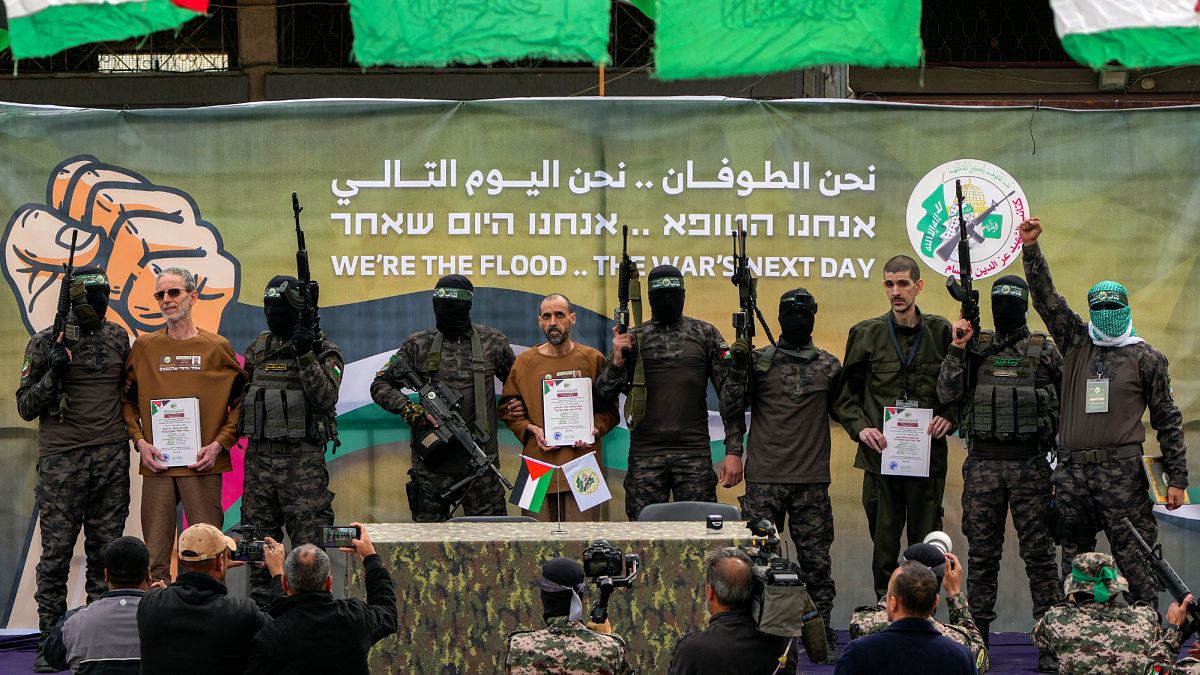
The Director of Israel’s Sheba General Hospital has said she is concerned about the wellbeing of the remaining hostages being held by Hamas in Gaza after the militant group released three Israeli civilians on Saturday who appeared pale and gaunt.
Doctor Yael Frenkel Nir, who also heads the hospital’s medical response team for returning hostages, said the appearance of the three men, “arouses in us a deep and serious concern for the fate of those who remain in captivity.”
“Our first duty as doctors, as humans and as a society, is to work for the return of all the hostages until the last one,” she said.
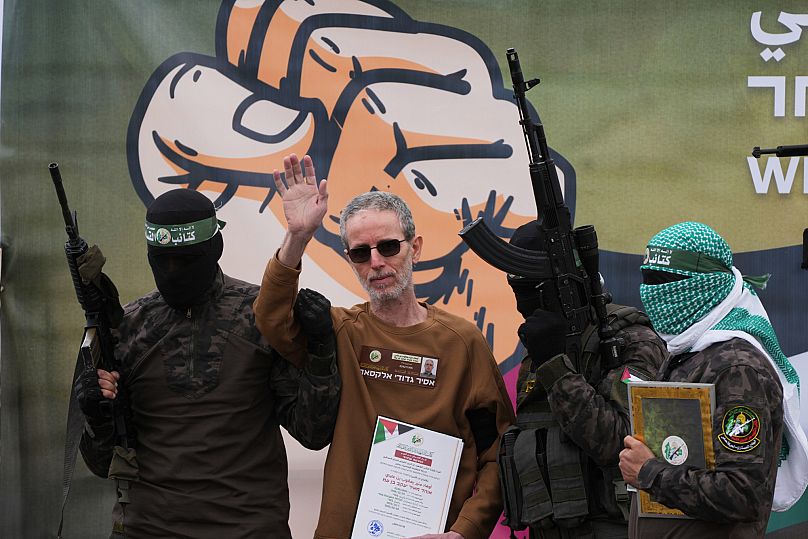
“This is the fourth time in the current situation (ceasefire) that we received returnees and the situation is more serious this time. Keeping humans in captivity in such deplorable conditions has serious health consequences. From the medical knowledge we accumulated, the long time in captivity is reflected by a significant deterioration in their condition.”
Eli Sharabi, 52, Ohad Ben Ami, 56, and Or Levy, 34, were released on Saturday afternoon in the fifth such hostage release as part of the Gaza ceasefire deal, the first phase of which came into effect on 19 January.
But they appeared to be in much poorer physical condition than any of the other 18 hostages released so far and that has sparked widespread concern among Israeli civic society and human rights groups.
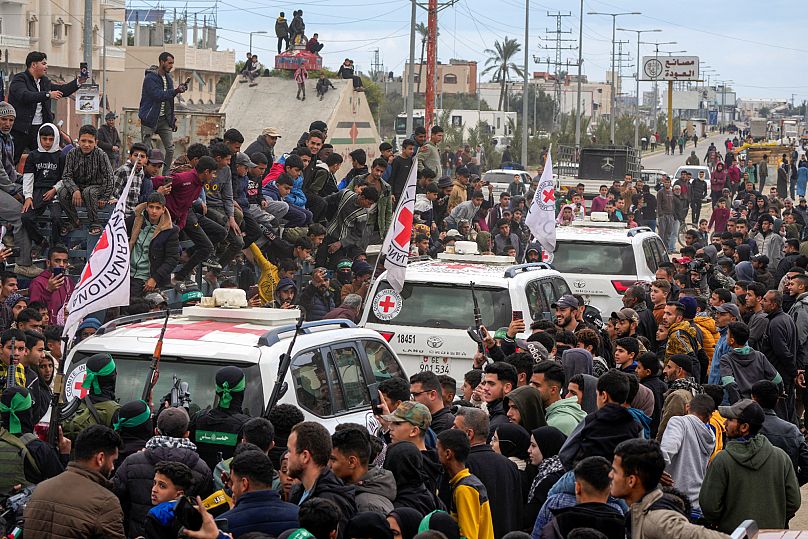
The men being led onto a stage by armed Hamas fighters and apparently forced to make public statements before a crowd of hundreds has also been criticised.
The International Committee of the Red Cross said that it is becoming increasingly concerned about the way Hamas frees hostages, criticising the heavily stage-managed events that accompany their release.
The ICRC said it “strongly (urges) all parties, including the mediators, to take responsibility to ensure that future releases are dignified and private.”
The group said it had conveyed that message “privately and publicly” to both Hamas and Israel.
The scenes in Deir al Balah also drew a strong rebuke from Israeli leaders who said the hostages looked like Holocaust survivors and denounced their release as a spectacle.
In a video statement later on Saturday, Israel’s Prime Minister Benjamin Netanyahu slammed Hamas as “monsters” and again vowed to destroy the militant group.
“I say to them again: They will pay the price. We will do everything to return all of our hostages. We will see to their safety. This is the directive that I gave to the delegation – say this to the mediators and demand it. But beyond this, President Trump agrees with me completely: We will do everything to return all of the hostages, but Hamas will not be there. We will eliminate Hamas, and we will return our hostages,” he said.
And Israel’s Ambassador to the United Nations, Danny Danon, demanded Secretary General Antonio Guterres “unequivocally condemn Hamas’s cruel and inhuman treatment of our hostages.”
He also called on Guterres to demand the “unconditional release from the hell in Gaza” of the remaining 73 hostages being held by Hamas.
The hostages’ condition and scenes of Hamas forcing them to speak in a handover ceremony has sparked outrage in Israel and could increase pressure on Netanyahu to extend the ceasefire beyond its current six-week phase.
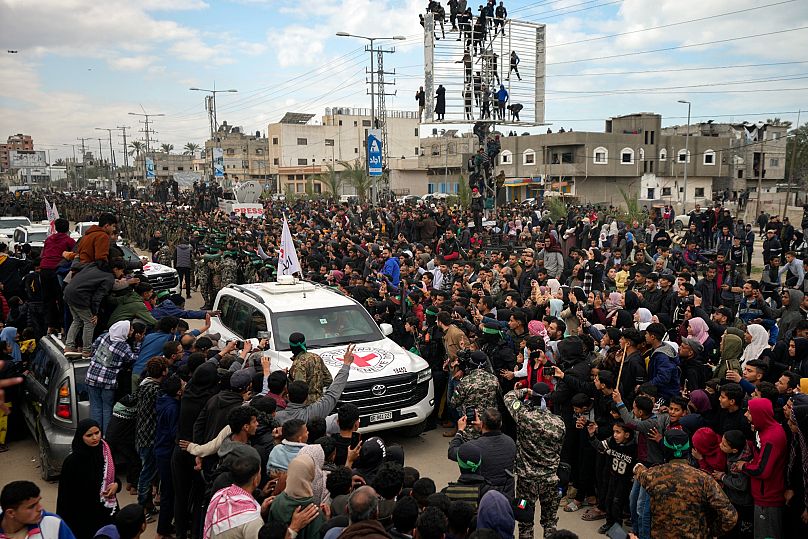
There have been more protests in Tel Aviv, with protesters demanding the immediate release of the remaining captives and criticising Netanyahu for “deflecting responsibility” for the hostage situation.
“When will he ever stand up for his responsibility and be able to say, I was responsible for 7 October and I will guide the negotiation team to enter into intensive talks and agree on the release of not the next hostage – the last hostage we want to see how he comes out,” said protester Ruby Chen.
“We all saw what a person who survived an inferno looks like. So if anyone had any doubt about how urgent it is to bring everyone back, if anyone imagined that the kidnapped could wait for after Iran, after Gaza, after the elections, if anyone dreamed that there were more important tasks than returning all the kidnapped, if anyone tried to sell us that 75% of the kidnapped who returned is a lot, today we got a wake-up call,” said Moshe Or.
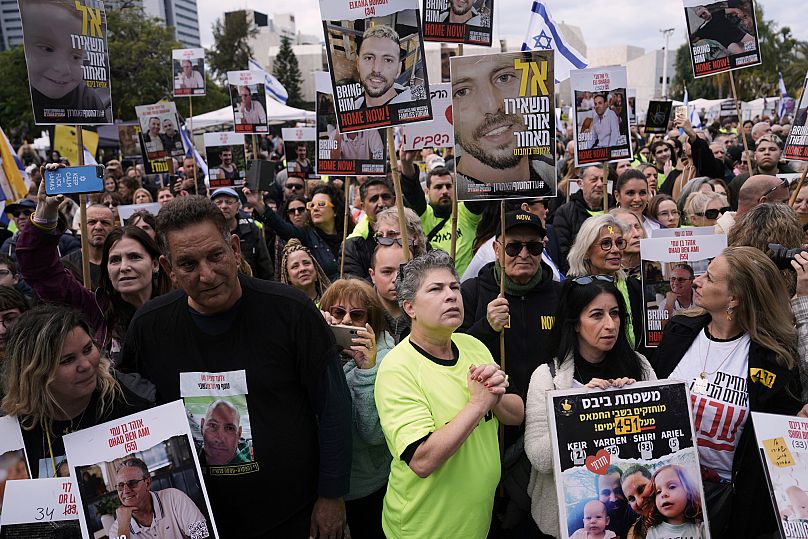
The three men, all of whom were captured by Hamas during the 7 October 2023 incursion into southern Israel, are currently being treated in two hospitals in Israel and have since been reunited with their families.
Israeli media have reported that Eli Sharabi, freed after 16 months of captivity, only found out that his wife and two daughters had been killed in the Hamas-led attack after his release.
His mother said he had had no access to any media reports while he was in captivity but had been reunited with his three-year-old son.





